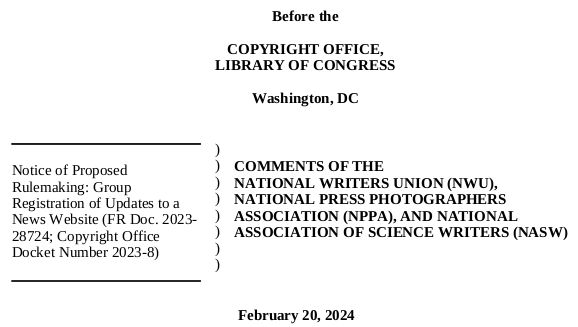Today the National Writers Union (NWU) was joined by the National Press Photographers Association (NPPA) and the National Association of Science Writers (NASW) in comments filed with the U.S. Copyright Office on a proposed rule for “Group Registration of Updates to a News Website”.
In its current rulemaking, the Copyright Office — after consulting news publishers but not journalists — is proposing a rule that would allow employers and publishers to register copyright in news websites that are created by their employees or contractors as “works made for hire”, but would prohibit journalists and other content creators from registering our own websites or freelance work. It’s hard to imagine a rule more categorically biased in favor of publishers over content creators.
Most web content creators, including NWU members, have never registered any of our copyrights. If we try to do so, we quickly realize that, as applied to typical web content, the procedures for copyright registration are so cumbersome and the registration fees are so high that it isn’t worth our time or money.
Registrants also have to guess whether each web content element will later be determined by a court to have been “published” or “unpublished”. There’s no way to find out for sure at the time of registration, but if we guess wrong, the registration can later be voided (when it’s too late to correct it) and the time and money we spent on registration will have been wasted.
But under U.S. law (unlike the law in the rest of the world), copyright registration is important.
If we don’t register each of our works within three months of its first publication, we can never recover our attorney’s fees, even if we succeed in a lawsuit against someone who infringes our copyright. Since lawyer’s fees for a copyright infringement lawsuit are typically at least tens of thousands of dollars, more often several hundred thousand, ordinary creators can’t afford to sue to enforce our rights. Unregistered works, including almost all web content, are thus fair game for infringement.
This registration requirement isn’t just a bad idea. It’s also a violation of international law.
Copyright treaties to which the U.S. is a party require that “effective” remedies be made available for all cases of copyright infringement, without “formalities” such as registration. A legal “remedy” that requires the victim — an individual media worker — to pay tens or hundreds of thousands of dollars in legal costs, with no possibility of recovering those costs even if they “win” their court case, is a sham.
The position of the NWU, like that of almost all of our international allies, has always been that copyright registration is exactly the sort of “formality” that these treaties were intended to prohibit. It should either be repealed or made optional and not a precondition for recovery of legal fees or damages.
We have repeatedly urged the U.S. Copyright Office to remind Congress of its obligations under international copyright treaties. Until Congress acts to bring the U.S. into compliance with international law, we continue to lobby the Copyright Office to use its authority to promulgate regulations to make copyright registration less outrageously costly and time-consuming, especially for web content.
We’ve won small concessions, but nothing that changes the fundamental problem for most web content creators, including independent journalists and other freelancers and self-publishers.
In the comments we filed today, we’ve asked the Copyright Office to remove the unnecessary and unfair limitation of the rule to “works made for hire.” Only sites containing certain types of news content, as judged by Copyright Office examiners, would be eligible for registration under the proposed rule. This sort of content-based discrimination in the fees charged for government services is an unconstitutional violation of the First Amendment. It serves no legitimate purpose, and would only make more work for the Copyright Office in trying to judge which content qualifies. In our comments, we’ve urged the Copyright Office to remove this restriction and allow all web content — news or non-news, fact or fiction — to be registered on the same terms for the same fees.
Even with these changes, this rule would only allow registration of certain “updates” to websites. It wouldn’t provide a procedure for registration of new or previously unregistered sites. As we’ve reminded the Copyright Office today in our comments on its current limited proposal, the real urgency is the rulemaking the Copyright Office has been promising for decades, since the dawn of the World Wide Web, for a workable procedure for registration of copyright in all types of web content.
If you want to get U.S. courts to enforce your rights to your creative work, join us!


 NWU is the sole provider of IFJ Press Passes to freelance journalists in the U.S.
NWU is the sole provider of IFJ Press Passes to freelance journalists in the U.S.